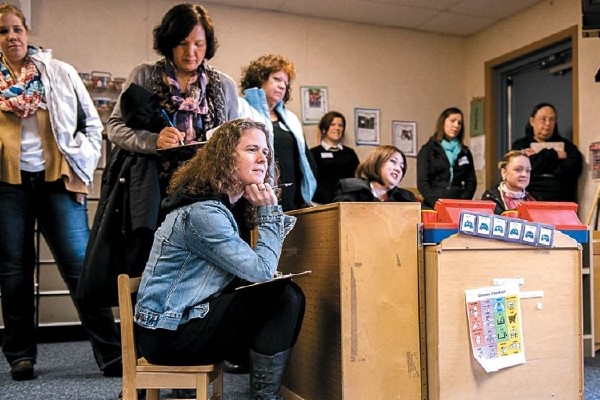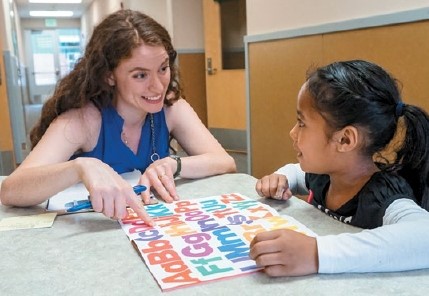Starting Transitions Early
August 01, 2016

Educators know the importance of supporting students as they transition from elementary to middle school, middle to high school and high school to college and career. But there is new focus and energy around the power of providing students and families support with their first school transition, from prekindergarten (or home) to kindergarten
Researchers describe the transition to kindergarten as a critical moment in students’ educational trajectories, which may point students toward success or failure in formal education. Studies by Robert Pianta, professor of clinical and school psychology at the University of Virginia, show that when families feel comfortable, connected and part of the school community, they are more likely to be engaged in their child’s educational journey.
Equally important, instruction and learning begin earlier because teachers don’t need to spend the first weeks of school making introductions and addressing separation anxiety. Connecting early and often with incoming kindergarten students and families provides a solid foundation for all parties to begin the education journey.
A Jump Start
Motivated by a superintendent who champions early learning, Highline Public Schools, located south of Seattle, Wash., launched in 2013 Kindergarten Jump Start, one of what are now several transition opportunities for incoming families. The program is a five-day transition experience to familiarize new students with school, staff, routines and procedures. It operates in each of the district’s 18 elementary schools and is free to families.
The district identifies families with young children and connects them to their neighborhood school beginning with kindergarten registration in January. Then Highline partners with early learning providers, community-based organizations and staff from Highline’s elementary schools to establish structures and programs to support incoming families.
This support happens through a variety of districtwide transition efforts, as well as school-based programs.
Multiple Approaches

In a school district with more than 19,000 students who speak at least 90 languages, one needs to offer a variety of districtwide transition efforts to reach as many as possible. Here’s what we do in Highline.
- Regional kindergarten registration date.
Seven districts across the region have a common kindergarten registration date in January to create common messaging, particularly in communities that speak languages other than English.
Highline uses its strong relationships with the early learning programs and community partners to stress the importance of kindergarten registration. The message is consistent: “Register now to access free kindergarten readiness programs and materials.”
Once registered, families are added to the school’s student information system so they will be invited to family events, which in turn build positive relationships before kindergarten begins.
- Prekindergarten play and learn programs.
At kindergarten registration, families that don’t have access to preschool are invited to attend one of Highline’s seven PreK Play and Learn programs, a free preschool experience facilitated in multiple languages and designed to support kindergarten readiness and educate caregivers. The program runs two days a week in schools, community centers and churches across the district. Some families attend at multiple locations to provide their child a full week of preschool.
- Family connection conferences.
One component of the state’s WaKIDS initiative is a family conference conducted during the first three days of school. Teachers meet with their new students and families during a 30-minute session. The meeting is designed for teachers to get to know the family and learn how to support individual students as they enter school.
- Kindergarten transition meetings.
Across the district, early learning staff and community partners host kindergarten transition meetings at various early learning locations and the central office. At these meetings, staff provide information about kindergarten, support the completion of enrollment paperwork and provide language support to help navigate the process.
- PreK-kindergarten focus schools.
Funded by mini-grants from the Bill & Melinda Gates Foundation, Highline’s elementary principals created early learning teams consisting of an administrator, a kindergarten lead teacher and an early learning partner whose program is a feeder preschool to the elementary school. The teams meet regularly to design meaningful transition events to engage families and promote alignment across their programs.
Expansion Plans
In addition to district-supported transition efforts, Highline’s elementary principals use school-based programs to address the specific needs of their incoming families. The key is to reach out to families, whenever possible in their own languages. The process begins with a welcoming experience when families come to the school for the first time to register. All of our schools provide families with kindergarten readiness kits containing home-learning activities in multiple languages.
One elementary school tries to meet with every family one-on-one when they turn in their enrollment paperwork. Other schools have created videos to introduce families to staff and school programs. Almost all of our elementary schools provide family transition meetings in the spring, which include classroom tours, instruction on early literacy development, bus rides from their child’s preschool program to the school and instructional materials to support learning at home.
Highline’s strategic efforts contribute to a school-based community that strives to be inclusive and welcoming to all families. The results have yielded engaged families and students who are excited about starting school. Schools are reporting record-high levels of engagement, with upwards of 85 percent of registered families in attendance at most transition events.
Next steps in early learning transitions include an expansion of the family meeting during Kindergarten Jump Start to create a Family Academy. This would extend family engagement throughout the school year and provide an opportunity for families to learn how they can support learning at home most effectively. Using a strengths-based model, the Family Academy also will build authentic leadership opportunities for parents to engage in school decision making and recruit other families to increase engagement.
We know that reaching families early to identify needs and promote kindergarten readiness will prepare our youngest learners to meet standards by 3rd grade.
Anne Arnold is director of early learning, P-3, for Highline Public Schools in Burien, Wash.
Lindsey Durant is early learning specialist for prekindergarten through 3rd grade for Highline Public Schools.
Advertisement
Advertisement
Advertisement
Advertisement



